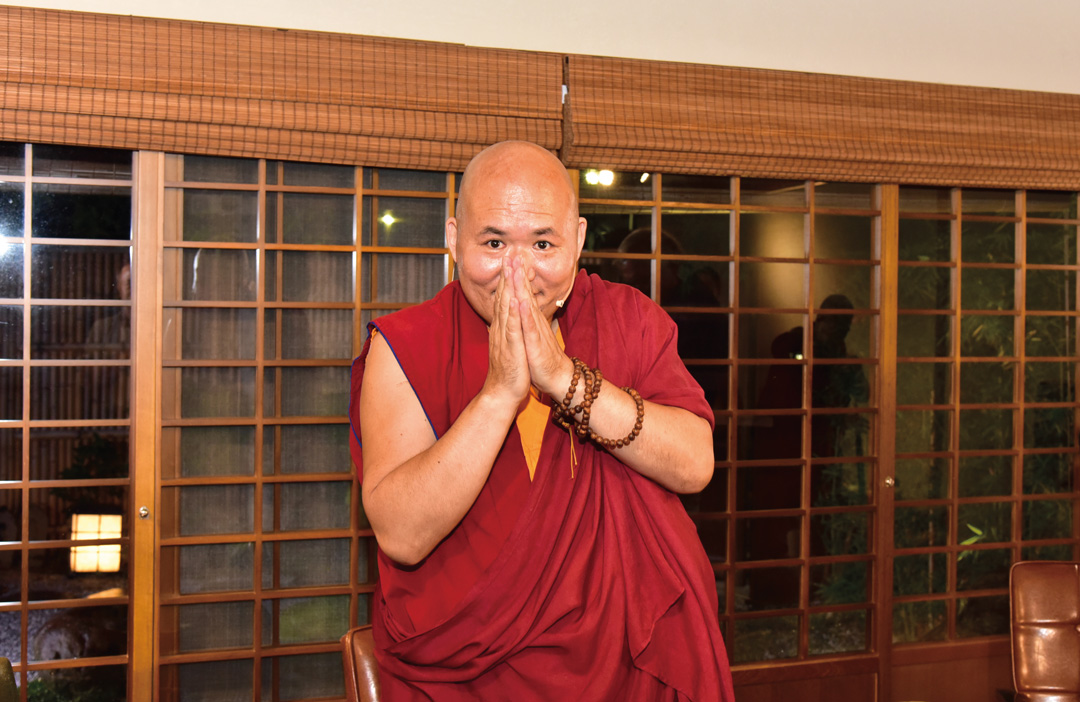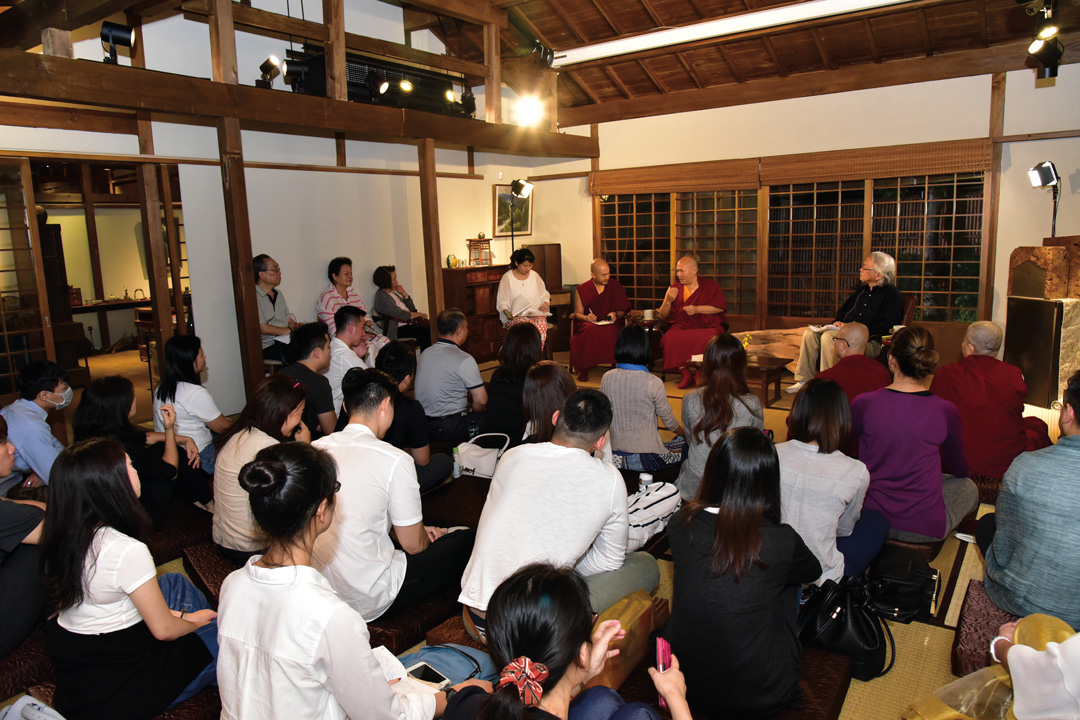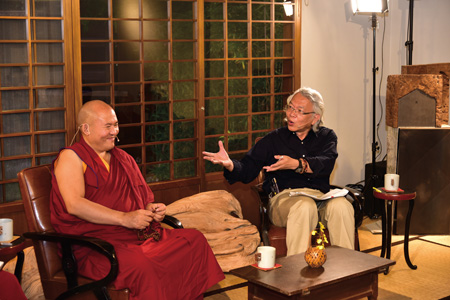【COLUMN∣JAMYANG 】Mind Management Is Not What You Think
Speaker: Khenpo Karma Lhabu
(Retreat master of Thrangu retreat center in Nepal)

Everyone has a mind, and thus we tend to fall into misconceptions that the mind is easy to manage and we are able to do it. The Buddhist tenet systems including Vaibhashika, Sautrantika, Cittamatra and Madhyamika are differentiated by their individual explanations of the mind, but their understanding is limited to only certain aspects of the mind. To have a comprehensive understanding of the mind, we must go through a graduated path; learning how to manage the mind is even more difficult than just understanding it. Becoming accustomed to observing the mind, then gradually deepening your comprehension is the beginning of mind management.
Observing the mind while feeling happy
Everyone has a mind, so we tend to think that it is manageable and that we know how to do it, but in actuality we don’t understand the mind at all. In daily life, we must become acquainted with our employees and get to know and understand them if we are required to manage them. Given this, how can we say we know how to manage the mind when we actually don’t understand it at all? This is rather strange. The reason we don’t know our minds is because no matter what we are doing, we look externally and judge our environments, but we fail to turn inwards and look at our minds, at our motivations. We need to realize that our behaviors begin with our minds, after which physical actions and verbal speech follow. Therefore, while determining whether an action is right or wrong, we must first examine our way of thinking, our motivation. To manage our minds, first we have to look inwards and observe it.
When is the proper time to observe our minds? It is not when we are having difficulties or problems, but when we are feeling happy. The mind is very clear and unobstructed when we are happy and content, making it easier to understand when we contemplate it. Through regular daily practice, it is possible to form the habit of managing the mind. We are able to thrive in society only after a long duration of study and skills acquisition, and similarly we need to practice and understand the mind over time in order to manage it.
Likewise, when practicing Buddhism, we follow the sequence of listening, contemplation and meditation. After hearing the dharma we have to contemplate it until there are no longer any doubts, and then we can start the meditation. Nowadays, there are many people who recite mantras and do practices without understanding but regard it as practicing Buddhism. A more beneficial and meaningful approach is to understand the dharma before practicing it. For example, “The Jewel Ornament of Liberation” by the master Gampopa is an essential text of the Kagyu lineage that lays out the graduated path to Buddhist practice. However, those who desire to practice are keen to look for a convenient method or only pay attention to advanced practices, neglecting to properly learn the key texts within one’s own tradition. This is not the right approach. Whether it’s conducting worldly affairs or studying Buddhism, there will not be any benefits if we don’t follow the steps sequentially.

Cooking or mind management: which should we strive to master?
While leading a retreat in England, a woman came to me and said she wanted to go into retreat. I asked if she knows how to cook. She replied that she doesn’t, but is willing to learn. Her friend, a successful cook, told her that it only takes a week to master it. This gave me pause for reflection: few people express that they don’t know how to practice or manage their minds, so they must spend a week learning. Buddhism seems to become an easy feat, a field of study that can be mastered quickly. But these are all misconceptions.
All our troubles and difficulties arise from the mind, therefore learning about it and managing it is extremely important. In this world, there are some who acknowledge the presence of a mind, but there are also many who don’t. From a Buddhist perspective, although there is the acceptance of a mind, there are various explanations attributed to it. For example, the four tenet systems of Vaibhashika, Sautrantika, Cittamatra and Madhyamika have different explanations of the mind, but they only present a portion of the whole picture. It is due to this difficulty in understanding the mind that makes managing it an arduous task. To understand it thoroughly, we have to go through a graduated path; to learn to manage the mind is even more difficult.
When receiving teachings on the nature of mind, many Shedra graduates at the retreat center cry in frustration in front of me. Although they tackle challenging subjects at the Shedra, they are not pushed to tears when they suffer setbacks. Why does this happen? While studying at the Shedra, there are books that they can refer and rely on when they are confused. However, at the retreat centre, while observing the mind and trying to let it settle, they have to rely on their own experience and observations without any hints or prompts, much less a standard answer. Thus, it really is quite challenging.
Begin your observation like a blank piece of paper
Personally, I believe that to know the mind we must start by observing our thoughts. It is very important to form a regular habit of doing so. Usually, we tend to focus on outer phenomena without observing our thoughts and what the mind is thinking. It is all right if you don’t know how to manage your mind, but it is crucial to form the habit of observing thoughts.
While observing the mind, we must not become accustomed to thinking that what we are looking at right now is “my mind”. Why is that? Because once we have this way of thinking, we will not know where the mind is no matter how hard we try. When observing the mind, we should start like a piece of white paper, knowing nothing, with no preconceived conceptions. At the retreat center, these teachings are conducted one on one so that we can observe from our own experience what the mind is and where it is, without being influenced by other’s ideas.
Forming a habit of observing one’s mind
Even though recognizing the mind is difficult, we can still begin with selecting a conducive environment. People are easily affected by their environment, thus we should try our best to be situated in a suitable environment before we start observing our minds. If you are surrounded by people who are fixated on exterior phenomena instead of looking inwards, you will naturally turn out to be just like them.
Once a girl around eight or nine years old came to me accompanied by her parents. Even though she was quite young, she said she didn’t want to be reborn again and suffer in samsara, and wanted to be ordained and practice at the retreat. Her family agreed but were worried about her young age. At that time, I said that I can’t promise she will turn out to be a good practitioner at the retreat center, but I will try my best to teach, and promised that if she stayed in the retreat center and really focused on training her mind, her mind will be healthy and not fall ill. Nowadays many people have healthy bodies but suffer from mental illnesses, leading to the problems that society is facing. In actuality, all the troubles, worries and suffering are problems of the mind.
Environment creates the biggest impact on a person, especially the behaviors demonstrated by our parents or teachers. Their value systems and behaviors create a setting that continuously affects a person, thus highlighting the significance of a proper environment. To conclude, everyone must form the habit of observing one’s mind. By doing so, we can gradually recognize and understand it, and truly be able to manage it. 
A smile that says all

Professor Huang Chung-Professor Huang Chung-Hsing listened carefully while Khenpo Lhabu was speaking, but kept a perpetual grin on his face that made everyone curious. When his turn came, he asked Khenpo, “I am a really good cook. Does that mean I can skip the training and come directly to the retreat center?” This was referring to an incident that occured while Khenpo was leading a retreat in England.
Everyone, including Khenpo who is widely considered rather stern by students, broke into laughter. Professor Huang’s humor shortened the subtle gap between the speakers and the audience, enhancing the flow of the seminar. While basking in their shared laughter, the audience experienced an interaction among minds.

JAMYANG 蔣揚
A native of Taiwan, Jamyang grew up in Singapore and gradually developed an interest in studying languages. He is currently learning Tibetan.
出生在台灣的蔣揚,在新加坡長大,並對語文感到興趣,目前正在學習藏文。